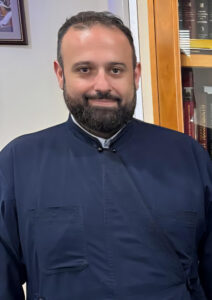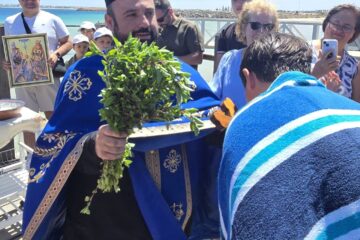By Fr. Michael Psaromatis
Greek Orthodox Archdiocese of Australia
Forgiveness is spoken about often in our culture, but it is rarely practised. In our country, Australia, we have seen forgiveness shine in a way that touched the whole nation. After a drunk driver killed three of their children and their niece in Sydney, Danny and Leila Abdallah publicly forgave him. They did not excuse evil. They placed judgment in God’s hands and refused to let hatred rule their home. The courts did their work, but inside the cycle of revenge was broken. What they did was nothing less than a living act of συγχώρησις (synchoresis): they widened their hearts to make space for God’s grace instead of shrinking into bitterness. Their witness showed Australians that forgiveness is not passivity but strength, not denial but truth joined to mercy.
Most people are offered two paths after they are wronged. One path is payback, where striking back is called justice. The other is self care, where soothing oneself is called forgiveness. Both are thin paths that leave the heart unsatisfied. The Orthodox Church offers something different. Forgiveness in the Church is not revenge and not a psychological exercise. It is the healing of communion with God and with one another.
Scripture shows God as merciful and gracious, slow to anger, and rich in steadfast love (Exodus 34:6; Psalm 103:8–11). He does not repay us according to our sins, and He desires that we turn and live (Ezekiel 18:23). In Jesus Christ this mercy becomes visible. Christ is our peace. By the Cross He reconciles us to the Father and breaks down the walls between us (Ephesians 2:14–16). He even ties worship to peacemaking when He tells us to seek peace with a brother or sister before we come to the altar (Matthew 5:23–24). The Church receives from Him a ministry and a word of reconciliation (2 Corinthians 5:18–19). Forgiveness is not an idea to admire from a distance. It is the very life of God, received and lived by His people.
As Archbishop Makarios of Australia has often reminded us in his homilies, “to love one’s enemy is the greatness of our faith” and “forgiveness brings peace of soul and prepares us for the joy of the Resurrection.” In another homily he said, “The role of the Church is not simply to tell us what is right and wrong, but to teach us the truth.” These words reveal that forgiveness is not weakness but the strength of Christ dwelling in the heart, and that the truth taught by the Church is never abstract but always bound to mercy.
Modern society did not arrive at its two thin paths by chance. In the medieval West, Anselm of Canterbury explained salvation in a world of honour and debt: sin offended divine honour and a debt had to be satisfied (Cur Deus Homo II.20–21). Later scholastic writers often used legal and commercial language, speaking of sins and penances almost as tariffs and balances. The Reformation kept the image of the courtroom, teaching that Christ bore the penalty of the law for us (Calvin, Institutes II.16). These images sought to defend both justice and grace, but they trained generations of Christians to imagine salvation primarily as a legal case. In modern times the focus shifted inward, and psychology often described forgiveness as a way to soothe emotions or find closure. Scholars such as McCullough describe forgiveness as a coping mechanism that reduces stress (Beyond Revenge, 2008). Everett Worthington distinguishes between emotional release and reconciliation, highlighting the limits of therapy-based models (Forgiving and Reconciling, 2003). These insights are valuable, but if therapy becomes our only language, forgiveness turns into a tool of self management rather than a path to communion. Orthodoxy offers something deeper. It sees the human person not as an isolated individual managing guilt, but as a being created for communion with God and neighbour (Lossky, Mystical Theology of the Eastern Church, 1944). Forgiveness restores this communion.
In Greek, the ordinary word for forgiveness is Forgiveness or making space together (συγχώρησις, synchoresis). This is the anchor word. It literally means “making space together” or “coming into the same place.” It shows that to forgive is not simply to cancel a debt, but to widen the heart so there is room again for the other, for truth, and for God’s grace. It is not sentiment and it is not amnesia. It is the restoration of communion. This is why συγχώρησις is the word most used in Scripture, in the Fathers, and in the living life of the Church.
Alongside this central word, the New Testament also uses three complementary words that deepen our understanding of forgiveness.
Release (ἄφεσις, aphesis) means to let go. Christ proclaimed release to captives (Luke 4:18), and in the Lord’s Prayer we ask for the forgiveness of debts (Matthew 6:12). His Blood is poured out for the remission of sins (Matthew 26:28). Ἄφεσις means handing the case to God so that private vengeance no longer rules the heart. The parable of the unforgiving servant warns us that those who demand repayment while seeking mercy condemn themselves (Matthew 18:21–35). Saint John Chrysostom teaches, “Nothing makes us so like God as our readiness to forgive” (Homilies on Matthew 61.4). In practice this begins with a short prayer: Lord Jesus, You know what happened. I place my claim to collect in Your hands.
Gift (χαρίζομαι, charizomai) is built on grace. Saint Paul says forgive one another as God in Christ forgave you (Ephesians 4:32; Colossians 3:13) and calls the Corinthians to comfort and reaffirm love for the one who has repented lest he drown in sorrow (2 Corinthians 2:7–10). Forgiveness here is a gift aimed at the other person’s true good. That may include consequences and firm boundaries. It is not naivety. It is the refusal to let spite set the will. Saint Isaac the Syrian writes, “Show mercy on your brother, and God will show mercy on you” (Ascetical Homilies II.48). In practice it may be one daily sentence of prayer for the person, or a hidden act of almsgiving in their name with your priest’s blessing.
Reconciliation (καταλλαγή, katallage) means the exchange of enmity for communion. This requires two sides and three signs: truth faced without spin, repentance shown in deeds, and peace guarded for all. If one is missing, forgiveness may still be offered at a wise distance. If all three appear, reconciliation can begin slowly and with help. Saint Maximus the Confessor explains that blessing enemies breaks the cycle of anger and opens the possibility of restored peace (Centuries on Charity IV.90). Christ Himself models this on the Cross, praying “Father, forgive them, for they know not what they do” (Luke 23:34). Saint Stephen follows Him, crying, “Lord, do not hold this sin against them” (Acts 7:60).
No one walks this path alone. A spiritual father steadies the work with discernment, what the Fathers call watchfulness and economia, the pastoral art of applying the Gospel with healing discernment. He helps us tell the truth simply, refuse inner trials of the other, and keep a basic rule of prayer. He may bless silence for a season, or a letter that names the harm without blame, or a mediated conversation. He will also teach us to bring names to confession and to the Proskomide, the preparation of the bread and wine for the Liturgy, for commemoration. Prepare a list with baptismal names, living on one side and departed on the other. For the living include your bishop, parish clergy, spiritual father, household, godparents and godchildren, benefactors, the person you struggle to forgive, those who wronged you, those you have wronged, and anyone who has asked your prayers. For the departed include those you carry in your heart, victims of tragedy, and those who fell asleep at enmity with you. If some are not Orthodox, place them on a separate line; the priest will still remember them at the litanies or privately. Bring the list with prosphora to the Prothesis. Each particle placed on the diskos, the small plate beside the Lamb of God, rests before Christ during the Liturgy. Your prayer for those who harmed you is raised before the altar of heaven itself (Cabasilas, Life in Christ VI.4).
Forgiveness is truthful. It never pretends. It does not falsify the harm or demand a return to danger. At times the right obedience is distance while civil and church processes do their work. At other times it is a careful meeting. Sometimes it is a silent season with steady prayer. The point remains the same. We do not carry private revenge. We do not lie about the truth. We seek the other person’s real good before God.
This Orthodox path differs sharply from the other two. Payback promises control but leaves us enslaved to hatred. Self care promises calm but forgets justice and the other person. The Orthodox way joins truth with mercy, justice with peace, and boundaries with love. It refuses to hand the future to rage or to reduce forgiveness to a private psychological exercise. It calls us to live what we receive at the Chalice: the remission of sins that makes peace possible.
The Church has always witnessed to this. The martyrs of Lyon in 177 AD forgave their persecutors and prayed for their conversion (Eusebius, Ecclesiastical History V.1–2). Saint Dionysius of Alexandria in the third century told his flock to welcome back those who had betrayed them during persecution. Centuries later, Saint Maria of Paris, who died in a Nazi camp, prayed for her captors even as she walked into the gas chamber. And in our own day, the Abdallah family’s witness has reminded Australians that forgiveness is nothing less than συγχώρησις: the widening of the heart so that hatred does not rule and grace may enter.
This way of life belongs in ordinary places. In the home it means speaking the truth without poison and making apologies that repair. Parents can model this and teach children to separate a deed from a person and to pause before reacting. In schools it means calming anger and building skills for honest repair. In workplaces it means clean amends and a refusal to let grudges shape the culture. In courts it can include carefully guided restorative meetings that centre truth, responsibility, and repair while consequences remain in place. And in our digital age it means refusing to let social media become a theatre of anger and division, choosing instead to witness to patience and mercy in how we speak and respond online. The wisdom of the Church serves the common good here.
Orthodox worship trains this life into us. We pray for peace from above and for the forgiveness of sins. Before the Creed we are told to love one another that with one mind we may confess: Father, Son, and Holy Spirit, Trinity one in essence and undivided (Divine Liturgy of Saint John Chrysostom). At the start of Lent we bow to each other and ask pardon (Forgiveness Vespers). In confession absolution is given as medicine that loosens the knot of resentment (Saint John Chrysostom, On Repentance). In Holy Communion mercy is placed in our mouths for the remission of sins so that mercy can move through us to others (Matthew 26:28). Forgiveness in the Liturgy is never only personal. It is cosmic. The peace we pray for is peace for the whole world, and our small acts of letting go are joined to the Church’s great prayer for the reconciliation of all creation (Romans 8:21).
As a priest, I have seen again and again how forgiveness, though often slow and painful, becomes the seed of healing in families, in parishes, and even in entire communities. What begins as a whispered prayer in private often grows into peace that others can touch and share.
The first steps can be very small. Bring one name to mind and tell God in a single sentence what happened. Ask for one good thing for that person, and then say the aphesis prayer while making the sign of the Cross. Write a Proskomide list with that name among the living and bring it with prosphora on Sunday. Ask your priest for one simple rule for the coming week. If it is the right time to speak, let your words be calm and limited to what is needed. If it is not yet wise to speak, remain silent but keep praying. Do not try to resolve everything in a single day, but return to prayer faithfully and allow the guidance of your spiritual father to direct the next steps.
Society will continue to offer only two options: revenge, which promises control but leaves us bound to hatred, or private calm, which soothes the feelings but forgets justice and the other person. The Church offers something greater. She gives us the Orthodox path, the Christian way of life itself, which unites truth with mercy, justice with peace, and boundaries with love. To forgive is to hand the case to God, to will the good of the other before Him, and to keep the heart open rather than closed. Reconciliation then becomes possible only where truth, repentance, and peace can stand together. When this way is lived daily, supported by the prayers of the Church and the counsel of a spiritual father, the memory of harm loosens its grip, justice becomes steady without rage, and love grows strong without pretending. This is the Orthodox way of forgiveness. It is not only possible but it is already the beginning of the Kingdom, where God will be all in all (1 Corinthians 15:28) and where every tear will be wiped away (Revelation 21:4). When Australians saw the Abdallahs forgive, they glimpsed not only human courage but the Resurrection itself breaking into our world. Forgiveness is always the first light of the Kingdom where love will have the final word.
*****
 Fr Michael is a priest of the Greek Orthodox Archdiocese of Australia. He has studied Information Technology, Modern Greek, and Theology at Flinders University. With a deep love for music, theology, and arts Fr Michael brings a dynamism to his ministry.
Fr Michael is a priest of the Greek Orthodox Archdiocese of Australia. He has studied Information Technology, Modern Greek, and Theology at Flinders University. With a deep love for music, theology, and arts Fr Michael brings a dynamism to his ministry.
His 13 year ministry has included service in aged care, the youth, regional communities, and meeting the needs of busy Parishes with Presvytera Stavroula.
Fr Michael is also actively involved in Orthodox missionary outreach in the Pacific, particularly in Fiji. He has spent time in the region serving liturgy, engaging with local communities, and working towards the development of the mission.
He is currently serving at the Parish of St Dimitrios, Salisbury, in South Australia.



0 Comments